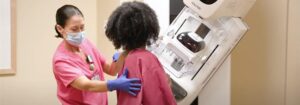 The Hewitt Center for Brest Wellness at Griffin Hospital – like all mammography facilities – includes information about breast density in letters to patients following their annual mammogram. This information helps women become more aware of their breast density so they can decide, in consultation with their healthcare provider, whether or not to pursue additional breast imaging screening. Being told you have dense breast tissue should not cause undue anxiety.
The Hewitt Center for Brest Wellness at Griffin Hospital – like all mammography facilities – includes information about breast density in letters to patients following their annual mammogram. This information helps women become more aware of their breast density so they can decide, in consultation with their healthcare provider, whether or not to pursue additional breast imaging screening. Being told you have dense breast tissue should not cause undue anxiety.
Having dense breasts is common – approximately 40 percent of women have dense breast tissue. When a woman has dense breasts, it means she has a lot of fibrous or glandular tissue, and not much fat in the breasts. Some women have more dense breast tissue than others. For most women, breasts become less dense with age. But in some women, there’s little change as they age.
How do I know if I have dense breast tissue?
Having firmer breasts does not mean you have dense breasts. Dense breasts can only be determined by having a mammogram reviewed by a radiologist, who will score your breast density as A, B, C or D. Dense breasts will have a ‘C’ ranking meaning the breast tissue is ‘heterogeneously dense’. The ‘D’ ranking means the breast tissue is ‘extremely dense’.
Are dense breasts a risk factor for breast cancer?
According to the American College of Radiology, women with extremely dense breasts are four to six times more likely to develop cancer than women with fatty breasts, due in part to the masking of small masses and lesions by the dense tissue. Age, family history, and medical history are additional risk factors for developing breast cancer.
Dense breast tissue makes it harder for radiologists to see cancer. On mammograms, dense breast tissue looks white, whereas fatty tissue looks black. Breast masses or tumors also look white, so the dense tissue can hide tumors.
What should I do if I have dense breast tissue?
If your mammogram report says that you have dense breast tissue, talk with your provider about what this means for you, especially if you are already in a high-risk group. High-risk individuals include those who have gene mutations, a strong family history of breast cancer, or other risk factors. Having dense breasts may mean that you will need to have more frequent mammograms, or a MRI along with your yearly mammogram.
Dense Breast Screening Technology at The Hewitt Center for Breast Wellness
The Hewitt Center for Breast Wellness at Griffin Hospital utilizes the latest 3D technical innovations and screening protocols to allow detection of even the smallest tumors. Studies show that 3D mammography, or tomosynthesis, offers such incredible detail that can detect high risk legions in dense breasts that could be missed on conventional 2D images. This technology also reduces the need for women to return for additional screenings because it increases physician confidence in the findings. Additionally, the Center offers breast ultrasound imaging for women with dense breast for even more confidence in the screening results.
The Hewitt Center also utilizes a rapid diagnostic model where patients are often given test results the same day imaging tests are performed and, if indicated, follow up testing (ultrasound, breast biopsy) and even consultation with a breast surgeon are often available the same day if the patient’s schedule permits. For more information, call (203) 732-1300 or visit Hewitt Center.
Reference Sources/Citations: